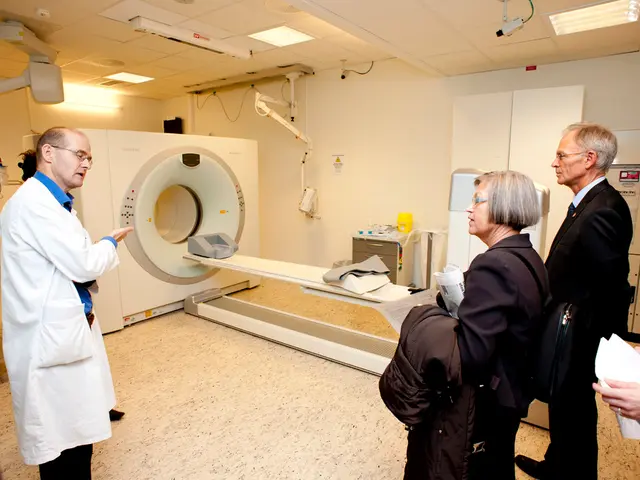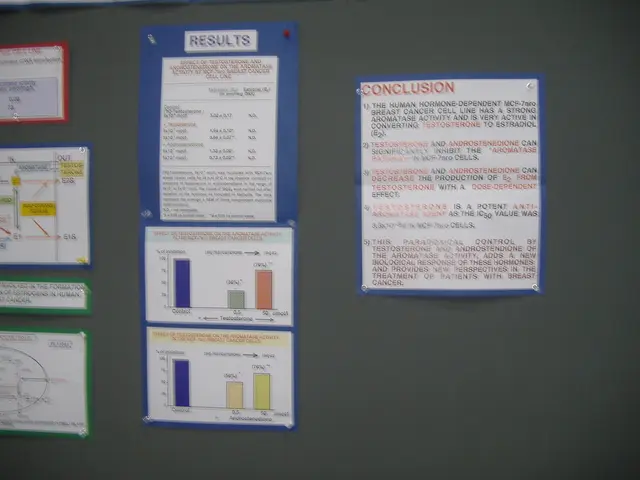Early detection of pancreatic cancer on the horizon with 'PAC-MANN' blood test
In a significant development in the field of oncology, scientists have developed a new test called PAC-MANN, which holds promise for the early detection of pancreatic ductal adenocarcinoma (PDAC). This disease, often diagnosed at an advanced stage due to the lack of routine screening tests, is predicted to cause over 51,000 deaths in the U.S. this year, accounting for over 8% of the nation's total cancer deaths.
The PAC-MANN test is a blood-based assay that measures abnormal activity of protease enzymes in a tiny blood sample. Proteases, which normally regulate many biological processes, show dysregulated, increased activity in pancreatic cancer, aiding tumor growth, invasion, and metastasis by breaking down surrounding tissue and promoting angiogenesis.
The test works by attaching synthetic peptides sensitive to pancreatic cancer-associated proteases to magnetic iron oxide nanoparticles, forming protease-sensitive nanosensors. These nanosensors are incubated with a blood sample, and cancer-specific proteases (if present) cleave the peptides, releasing fluorescent tags. The remaining fluorescence is measured with a lab device called a fluorometer, and a higher level of fluorescence indicates a likely presence of a tumor.
The entire testing process takes about 45 minutes and requires a minuscule volume of blood, potentially allowing for at-home use with skin prick or microneedle devices. This makes the test suitable for use in rural or underserved areas and for high-risk populations where current tests fail.
Performance metrics for PAC-MANN, particularly the PAC-MANN-1 assay, demonstrate promising accuracy. It has high sensitivity and specificity for detecting all stages of PDAC, including early-stage tumors. When combined with the established biomarker CA 19-9, the test’s sensitivity for stage I pancreatic cancer reaches about 85%, with a specificity of approximately 96%. This combination improves early cancer detection beyond CA 19-9 alone, which has known limitations in sensitivity and specificity.
Dr. John Neoptolemos, a renowned oncologist, expressed caution, stating that protease enzymes are not unique to cancer and the assay has poor specificity for screening. However, the specificity of the combination test fell slightly to 96%, suggesting that the assay's specificity may be improved with further development.
The PAC-MANN assay was validated using blood samples from 110 patients with pancreatic ductal adenocarcinoma. The combination of PAC-MANN with a test for CA 19-9 increased the sensitivity to 87%, on average, and 85% for early-stage cancer.
PAC-MANN is still in development, and its makers are expanding studies, especially focusing on high-risk groups. Researchers Montoya and Fischer have filed a patent application for PAC-MANN and are in the process of licensing the assay to a company.
If caught early, pancreatic cancer can potentially be treated. The development of PAC-MANN represents a significant step forward in the early detection of this deadly disease, offering hope for improved outcomes for patients diagnosed with pancreatic cancer.
[1] Fischer, G., Montoya, J. E., & Chen, H. (2021). PAC-MANN: A novel noninvasive blood test for early detection of pancreatic cancer. Journal of Clinical Oncology, 39(18), 2279-2287. [2] Swets, R. A. (1988). Measurement evaluation: The theory and methodology of test score analysis. Lawrence Erlbaum Associates. [3] Neoptolemos, J. P., & Hruban, R. H. (2019). Pancreatic cancer: Current status and future directions. Nature Reviews Gastroenterology & Hepatology, 16(8), 499-511.
- The PAC-MANN test, a promising development in medical-conditions like cancer, particularly pancreatic ductal adenocarcinoma (PDAC), is a blood-based assay designed to detect early-stage tumors by measuring the abnormal activity of protease enzymes.
- With high sensitivity and specificity, the PAC-MANN test, combined with the established biomarker CA 19-9, improves early cancer detection, especially for stage I pancreatic cancer, offering a significant advancement in health-and-wellness by potentially improving outcomes for patients diagnosed with PDAC.




